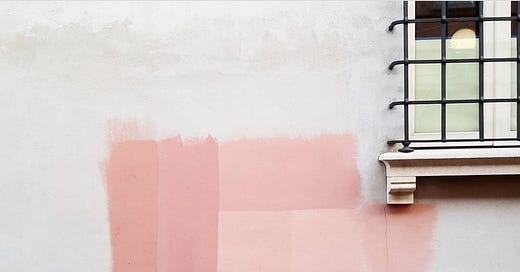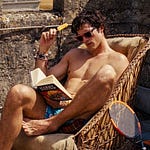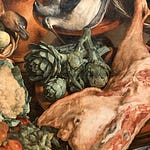The days are heating up and my mind passes into that place that finds itself longing. I’m looking for a little sensitivity, a little visual sensitivity. I guess something aesthetic. I’m looking for the softness that I learn is so unfashionable today. An awareness of the near and made, the little conjunctions of brand names and overheard words. The sensitivity of the fag poets. An awareness of material things that set in motion non-specific emotions, I guess some might say wistfulness, or beauty, like, for example, dusty shades of colours that are washed out, shades produced only by vibrant paint lost to the sunlight, or things that in winter are dreary yet in summer are beautiful. Other people have other words for these things but for me they’re evoked only in the idea of the fag poets.

What I keep trying to get to is some sense of sensual loss and sensual longing. I’m taking some time to imagine walks I cannot take. A walk is a foreign country right now. The sensitivity of fag poets is missing from experience and so in solitude grows so much more. What are they seeing? What are they seeing that I don’t? That the longing for these material things – the dusty walls, the cheap printed paper they wrap fruit in, the bare ankles of Italian boys between their trainers and blue denim, cast against the terrazzo floor of the bakery – are somehow stand-ins for the intensity of emotions that themselves can’t be adequately described. They manage to catch a resentment for having ever felt them in the first place, and the greedy and guilty desire to catch them again. It must be a curse to be such a poet, and worse to be unable to put those longings into words given we are all about to be taunted with a perfect summer that could have been.
I’m thinking about Frank O’Hara, whose work suits well what is coming, a languid summer of lockdown. Especially here. Because, you know, I write here with the windows open, the sun across the olive tree that sits on the balcony, that the longing is going to be bad this time. It works, it’ll work, if I have to spend the summer sunbathing in bed, to read Frank’s poetry. I try and recall that walk I did a month before the lockdown, up through Gràcia, the one that reminds me of Frank’s poem. I’ll try and recall Frank’s poems.

I don’t have his book to hand, but I’ll try and recall his poems. I’ll try and recall the one in particular, in fact, the one about the Passeig de Gràcia (I don’t think it’s about the Passeig de Gràcia, but another street).
He mentions a coke, a cold coke, I imagine, drinking with you. That’s it, that’s the poem. That’s what got me. It’s such a perfect choice, a cold coke, on a warm day, drinking it with you. That soft craving for an instant taste. It places it, so specifically, a cold coke, Americana, Frank. I mean, “O’Hara”, for God’s sake. It drives the poem down cold chrome, ranks of telephones (like in the movies), railroad station, Greyhound, Golden Gate, and everything through the rear window. Tell me, kid.
Yet what is more notably universal than a cold coke? Warhol knew it, and regarded it as a great cultural democratiser. No amount of money can buy you a better coke than even the bum on the corner. Enjoy. I think for Frank and Andy it stood in for something emerging in American mass culture that recognised an anonymous pleasure for the fag, that it stood in for drifting back into the Fifth Avenue crowds, mass-produced pleasure. I think it’s different for us, like blue denim is different for us. I’m shooting in the dark here. I like coke, I like Andy’s coke too, and I like Frank’s coke best of all, but let’s not forget – it’s all the same coke. We can all want it.
So there’s the line about the coke, the best line. This is what the poem’s about – a sort of riff on another fag poet comparing some boy to a summer’s day. But it’s not a rose, it’s a coke. Perfect. There are lots of things Frank would rather be doing (tell me about it!) but nothing compares to the coke compares to you.

Let’s think what else Frank covers. From memory, a statue – a Brancusi? Or a Giacometti? Whichever, something about a body, the way it fills space, and there you are again, an American boy in Europe, the line cut through space as he removes his white t-shirt with blue stripes from his soft tanned body to hang it over the balcony edge. A nude descending a staircase (classic) There are flowers, orange tulips perhaps, which I imagine lining the street.
And he talks about taking you to the Frick which you’ve never been to, thank God, because now he can share that moment, and really Frank’s talking about new love, new orange tulip love, where each date is a new discovery, like the Frick, thank God, and you can slowly undress your own life in front of them, like here, the Frick, let me show you, thank God.
And so in that mid-century modern moment the poem is split like love across continents, it’s one where we can only remember a summer life of leisure. I can’t, try as I might, remember the places they visit together (I assume by train, with a hard leather suitcase, a room in a hotel or did they have to take two rooms in those days?) but it was the Riviera, I’m sure, or the Basque Country (definitely San Sebastian). But the memories in love are as faded as art now, just representations, analogues, lithograph imprints of the sensual. I can’t walk back through Gràcia now, and so this summer will have to get what I can from the dusty pink walls opposite.
All that art is all good and well but as a memory it’s a poor second-place to experience, isn’t it? At best we record but we cannot really transpose what it’s like. All those artists he runs through in the Frick or on the printed postcards Frank sells on the front desk of the museum, all of them can record something, but art can’t capture the experience of the boy removing his orange shirt that summer, against the wind.
And yet, in that moment, when we are most beguiled by some everyday sublime beauty, we are also transfixed by a sense of loss, of transience. This is dissolving even as I experience it, and I will be back where I started. That haunting of loss that mars the moment and poisons us with grief once it has passed, which ruins everything, is a seed of art. Maybe what Frank is suggesting is that we undo that process as far as possible, and be. Look, enjoy. Stomach, shirt, arms, statuary. You, buttocks, tulips. Coke.
And the point is, that art only ever approaches the memories of idyllic moments that now are a foreign country, and tries to fix it in place. It never gets it, the body I mean, that makes up being and moving and being in love. Memories are nothing like now. The past is in Europe, and what comes now, I mean, what is happening now, right now, in New York, is a record of this moment and all that is perfect about it, which is having a coke with you.

I hope all my subscribers are doing well — or as well as can be expected in current circumstances. Thanks for your continued support, both financial and moral. It has been invaluable in weathering this storm.
I thought during this extended lockdown that lots of us are going through, people might be looking for non-pandemic related entertainment to distract them, so I’ve started recording my last novel “Red Tory: My Corbyn Chemsex Hell” as an audiobook, releasing a chapter a day to subscribers. Find it for free here, on iTunes, Spotify, or on your podcatcher of choice.
Here are a few things by others that I’ve been enjoying recently, which you might also enjoy:
Suite 212 (which I bang on about all the time) has been releasing regular interviews with artists and producer to discuss the cultural landscape in the UK at the moment, alongside their work and other such things. Check them out here and subscribe to their patreon if you can help support them.
I’ve been rewatching old episodes of Jonathan Meades’ various TV programmes, mainly on architecture and the built environment, whose tone and style needs a revival. You can find a bunch of them on Meades Shrine; if you haven’t watched any, I really recommend you do.
The brilliant writer and artist Hannah Black has released her 2016 book ‘Dark Pool Party’ for free as a PDF. I read it when it came out in one of those “gulped down in a single sitting” situations. Go, read it. Download it here.
Please feel free to share and forward today’s newsletter with anyone who might be interested. For those just visiting, I send out a newsletter/podcast a week to paying subscribers — for less than $5 a month — and one a month for free subscribers. You can subscribe here, and, if you like it, please hit the like button. It helps other people find my newsletter.













Share this post